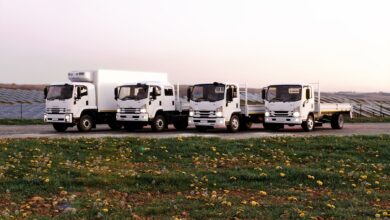Are you towing illegally?
Many drivers are unwittingly towing with the incorrect code of licence. CAR Mag clarifies what’s required to tow safely and legally on our roads.

Anyone who travelled on any of our regional or national routes during the recent year-end holidays would be aware of how many South Africans use their vehicles for towing – from lightweight luggage trailers to heavy caravans, off-road and deep-sea boat trailers. The concern where heavier trailers are involved is that many drivers are unwittingly towing with the incorrect code of licence, which can have serious legal implications and affect their insurance coverage. CAR Mag investigates the origins of the confusion, clarify the current licensing requirements, and provide some advice to motorists who find themselves on the wrong side of the law.
Looking for your next new or used Mahindra? Find it here with CARmag!
In 1998, SA driver’s licences went from being a sticker in one’s ID book to a credit card-format licence. As part of the change, new licence codes based on the European Unified Driving Licence System were introduced, with a five-year grace period allowed for existing licences to be replaced with the new type. Holders of the previous standard light vehicle Code 08 licence were issued with new EB licences, which allow the towing of trailers with a gross vehicle mass (GVM) greater than 750kg. This was despite their original test not including any towing-specific assessment.
Confusing matters further, any driver taking the standard light vehicle test after the introduction of the new codes is issued with a B licence. This licence allows towing, but only of trailers with a GVM of up to 750kg. This limitation is not a problem for those using a typical luggage trailer for holiday trips or occasionally hiring a light trailer to move furniture, but it does not allow you to tow anything heavier. While the licence card cannot be faulted as it clearly shows this limitation, it is also understandable that many have not picked up on the change. This is particularly when you consider that a parent or acquaintance who took essentially the same test before the 1998 changeover, holds a licence allowing them to tow heavier trailers.
Related: Nissan to introduce a new compact bakkie for lifestyle consumers?
In addition to the trailer GVM limitation for B licence holders, all drivers must understand the requirements and other limitations applicable to each of these different licence types – towing vehicles, trailers, and trailer braking requirements.
B licence holders
Issued to drivers who have successfully undertaken the standard light vehicle test, the B licence qualifies a driver to operate a motor vehicle with a tare mass (T) not exceeding 3 500kg, or an LCV/minibus with a GVM not exceeding 3 500kg. To clarify, T is the mass of the empty vehicle without fuel, while GVM is the maximum operating mass of the vehicle which includes passengers, cargo, and fuel.
In addition, an unbraked trailer up to a maximum GVM of 750kg may be towed, provided that the GVM of the trailer does not exceed 50% of the tare mass of the towing vehicle. This is an important consideration for those using lighter tow vehicles. For example, a typical compact crossover with a tare mass of 1 300kg would be limited to an unbraked trailer GVM of 650kg. These limitations are applied for safety reasons, as the towing vehicle needs to be able to safely cope with the additional trailer mass in terms of its steering, handling, and braking.
EB licence holders
The 3 500 kg maximum mass limits applying to the towing vehicle are unchanged from the B licence, however, the trailer GVM limitation of 750kg no longer applies, and braked trailers with a GVM above 750kg may be towed. The upper limit of the permitted trailer GVM is not specified but is subject to Regulation 151(1)(b)(i) or (ii) of the National Road Traffic Act 93 of 1996 covering brakes on trailers. In practical terms this limits the GVM of the trailer to the tare mass of the towing vehicle assuming an overrun brake is fitted, these being standard fitment on heavier trailers in SA. Any heavier than the tow vehicle tare mass and the trailer needs to be specially fitted with an expensive service brake system capable of being operated from within the towing vehicle. An additional limitation is the Gross Combination Mass (GCM) – maximum combined mass of the towing vehicle and trailer – as specified and homologated by the towing vehicle manufacturer.
Unfortunately, for motorists who find themselves with the incorrect licence for their towing needs, there is no easy upgrade from a B to an EB licence. The driver will be required to obtain a new learner’s licence and then undertake a driving test with a >750kg trailer attached. The test involves a pre-driving safety inspection, a yard section – which includes straight-line reversing and alley docking – and an on-road evaluation
Related: Mahindra’s Pik-Up Concept Looks Ready to Fight Ford’s Ranger
While some who only tow occasionally might question the necessity of the licence upgrade, the implications of non-compliance, both legally and to their insurance coverage in the event of an accident, could prove extremely costly. A check with a few insurance companies indicated that a claim involving an incorrectly licenced driver would be subject to a review and depending on the circumstances, could result in acceptance of the claim, acceptance subject to a higher excess, or rejection – not the sort of risk many drivers can afford to take. The sensible option is to confirm that you hold the correct licence for what you intend to tow and if not, book that EB learners and driving test as soon as possible.
Browse over 26 000 new and used cars here with CARmag!
The post Are you Towing Illegally? appeared first on CAR Magazine.




